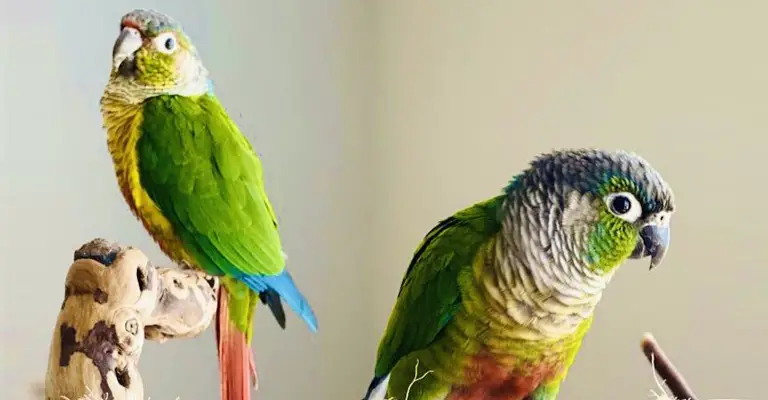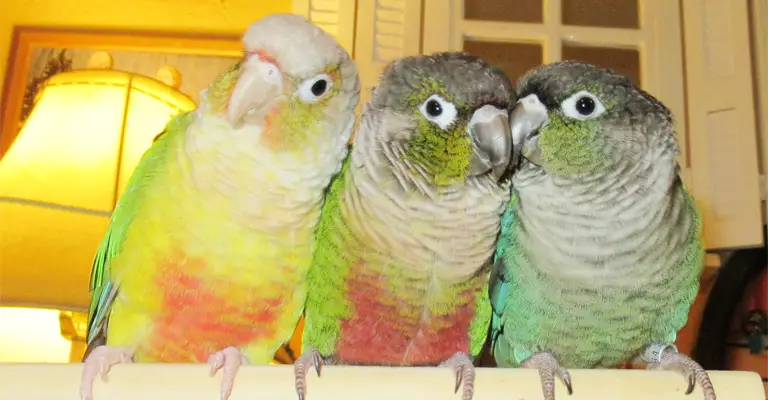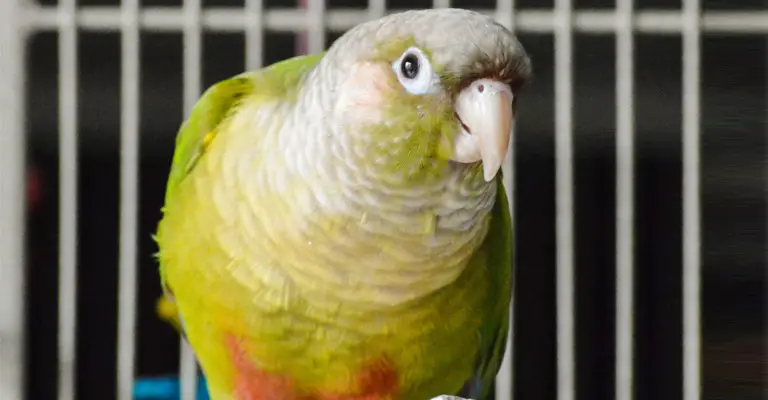Green Cheek Conures are charismatic and beloved members of the parrot family. As prospective or current owners, one of the most common questions that often arises is, “How long do Green Cheek Conures live?”
Apprehending the lifespan of these delightful birds is crucial for providing them with the best possible care and ensuring a long and happy companionship.
In this comprehensive guide, we will delve into the factors that influence the lifespan of Green Cheek Conures, offering insights into their typical lifespan in captivity, the importance of proper care, and tips to help extend their years.
Whether you’re a new Conure parent or a seasoned caregiver, this information will empower you to provide the best care possible and enjoy many wonderful years with your feathered friend. Stay focused.

How Long Do Green Cheek Conures Live?
Green Cheek Conures, a small parrot species native to South America, have an average lifespan of 15 to 20 years in captivity when properly cared for.
With the right diet, regular exercise, and a clean environment, some individuals have been known to live even longer, up to 25 years or more.
Providing a balanced diet of high-quality pellets, fresh fruits, vegetables, and occasional treats is essential for their longevity. Regular veterinary check-ups and attention to their social and mental needs also play a crucial role in their overall well-being and lifespan.
It’s important to note that the lifespan of a Green Cheek Conure can vary depending on the quality of care it receives, so responsible and attentive ownership is key to ensuring they live a long and healthy life.
Factors Influencing Lifespan of Green Cheek Conures
The lifespan of Green Cheek Conures can be influenced by several factors:
Diet
Providing a well-balanced diet with high-quality pellets, fresh fruits, and vegetables is essential. Poor nutrition can lead to health issues that shorten their lifespan.
Healthcare
Regular veterinary check-ups and prompt treatment of any illnesses or injuries can significantly impact their longevity.
Environment
A clean and safe living environment, free from toxins and hazards, is crucial. Exposure to harmful chemicals or extreme temperatures can harm their health.
Social Interaction
Green Cheek Conures are social birds that thrive on interaction and mental stimulation. Loneliness and boredom can lead to stress and a shortened lifespan.
Exercise
Regular physical activity is important for their physical and mental health. Lack of exercise can contribute to obesity and other health problems.
Genetics
Some genetic factors can influence lifespan. Birds from reputable breeders with good genetic backgrounds may have a better chance of living longer.
Stress
Avoiding stressful situations, such as constant loud noise or harassment by other pets, is important for their well-being.
Hygiene
Maintaining cleanliness in their cage and providing fresh, clean water daily can prevent diseases.
Disease Prevention
Implementing disease prevention measures, such as quarantine for new birds, can protect them from contagious illnesses.
Accidents
Green Cheek Conures are active and curious, so safeguarding them from accidents, like falling or getting caught in objects, is crucial.
By addressing these factors and providing proper care, owners can help ensure that their Green Cheek Conures live longer and healthier lives.
What Type of Environment Helps Increase Green Cheek Conure’s Lifespan?

Creating the right environment is crucial for increasing the lifespan of Green Cheek Conures. Here’s what you can do to provide an optimal living environment for these birds:
Spacious Cage
Provide a spacious cage that allows for plenty of room to move around, stretch wings, and play. The cage should be large enough to accommodate toys, perches, and feeding stations while allowing the bird to exercise.
Temperature
Maintain a consistent temperature between 65-80°F (18-27°C) to keep your Conure comfortable. Avoid drafts and extreme temperature fluctuations.
Lighting
Ensure your Conure gets exposure to natural sunlight or full-spectrum lighting for at least a few hours a day. Natural light is essential for their overall well-being and helps regulate their internal clock.
Social Interaction
Green Cheek Conures are highly social birds. Spend time interacting with them daily to provide mental stimulation and prevent loneliness. They thrive on social bonds and can become stressed if left alone for extended periods.
Toys and Enrichment
Offer a variety of toys, puzzles, and enrichment activities to keep their minds active and prevent boredom. Rotate toys regularly to maintain their interest.
Cleanliness
Maintain a clean living environment. Regularly clean and disinfect the cage, perches, and food/water dishes to prevent the spread of disease.
Diet
Provide a well-balanced diet consisting of high-quality pellets, fresh fruits, and vegetables. Avoid high-fat and sugary foods. Fresh water should always be available.
Exercise
Encourage physical activity by providing different perches, ropes, and ladders in the cage. Allow your Conure supervised out-of-cage time to stretch and fly.
Quiet and Safe Space
Ensure a quiet and safe environment. Protect your Conure from potential hazards and predators, including other pets.
Veterinary Care
Schedule regular check-ups with an avian veterinarian to monitor your Conure’s health and address any potential issues promptly.
Quarantine
When introducing new birds to your household, quarantine them for a few weeks to prevent the spread of diseases to your existing Conures.
By providing these elements in your Conure’s environment, you can enhance their overall well-being and increase their chances of living a longer and healthier life.
Diet That Helps Increase Green Cheek Conure’s Lifespan

A well-balanced diet is essential for increasing the lifespan of Green Cheek Conures. Here are the key components of a diet that can promote their longevity:
Pellets
High-quality, commercially available pelleted bird food should form the foundation of your Conure’s diet. Look for brands specifically formulated for Conures or small parrots. These pellets are designed to provide essential nutrients and are less likely to lead to imbalances than seed-based diets.
Fresh Fruits
Offer a variety of fresh fruits such as apples, pears, grapes, and berries. These provide vitamins, minerals, and natural sugars. Ensure the fruits are washed and free from pesticides.
Fresh Vegetables
Include a range of fresh vegetables like carrots, bell peppers, broccoli, and leafy greens. These provide essential vitamins and fiber. Make sure they are thoroughly washed and, if necessary, cut into small, manageable pieces.
Nuts and Seeds (in moderation)
While seeds and nuts can be a part of their diet, they should be offered in moderation due to their high fat content. Limit sunflower seeds and offer healthier options like almonds, walnuts, or pumpkin seeds as occasional treats.
Protein
Provide sources of protein such as cooked and unsalted legumes (e.g., lentils, chickpeas), and lean, cooked meats (e.g., chicken or turkey). These can be offered sparingly as a protein source.
Eggs
Occasionally, offer cooked, scrambled eggs for added protein. Ensure they are plain and cooked without any seasoning.
Calcium
Calcium is crucial for bone health. Provide a calcium supplement, such as a cuttlebone or mineral block, in their cage. You can also offer dark, leafy greens like kale, which are high in calcium.
Water
Fresh, clean water should always be available in their cage.
Avoid Toxins
Keep your Conure away from foods that are toxic to birds, such as chocolate, caffeine, avocado, and alcohol.
Variety
Rotate the types of fruits and vegetables you offer to provide a wide range of nutrients. This variety helps ensure they receive a well-rounded diet.
Portion Control
Be mindful of portion sizes to prevent overfeeding, which can lead to obesity and health issues. Monitor your Conure’s weight regularly.
Consult a Vet
It’s essential to consult with an avian veterinarian for dietary recommendations specific to your Conure’s age, health, and individual needs.
Remember that dietary needs can vary among individual birds, so it’s crucial to monitor their health and adjust their diet as needed. A balanced diet, along with proper care and attention, can contribute significantly to your Green Cheek Conure’s long and healthy life.
Tips to Help Increase Green Cheek Conure’s Lifespan
Increasing the lifespan of your Green Cheek Conure involves providing excellent care and attention to their physical and emotional needs. Here are some tips to help promote a longer and healthier life for your pet:
Nutritious Diet
Offer a balanced diet consisting of high-quality pellets, fresh fruits, and vegetables. Ensure that the diet is varied and provides essential nutrients. Avoid high-fat and sugary foods.
Clean Water
Always provide fresh, clean water in their cage. Change the water daily to prevent contamination.
Regular Veterinary Check-ups
Schedule routine check-ups with an avian veterinarian to monitor your Conure’s health, detect any potential issues early, and establish a preventive healthcare plan.
Clean Living Environment
Maintain a clean cage and surrounding area. Regularly clean and disinfect the cage, perches, and food/water dishes to prevent the spread of disease.
Exercise and Play
Encourage physical activity by providing toys, perches, ropes, ladders, and opportunities for supervised out-of-cage play. Mental stimulation is just as important as physical exercise.
Social Interaction
Green Cheek Conures are highly social birds. Spend quality time with your bird daily to prevent loneliness and provide mental stimulation. They enjoy interaction and companionship.
Environmental Enrichment
Rotate toys and add new ones to keep their environment stimulating and prevent boredom. Puzzle toys and foraging opportunities are excellent choices.
Natural Light
Ensure they have access to natural sunlight or full-spectrum lighting for a few hours each day to support their circadian rhythm and overall well-being.
Avoid Toxins
Keep your Conure away from toxic substances, including household chemicals, tobacco smoke, and plants that are harmful to birds.
Proper Sleep
Ensure your Conure gets enough rest by maintaining a consistent sleep schedule. They need 10-12 hours of sleep each night.
Quiet and Safe Space
Create a quiet and safe environment, away from loud noises and potential hazards. Protect them from other pets that may pose a threat.
Disease Prevention
Quarantine new birds before introducing them to your existing Conure to prevent the spread of diseases.
Stress Reduction
Minimize stress in their environment. Changes should be introduced gradually, and stressful situations should be avoided.
Grooming
Trim their nails and beaks as needed to prevent overgrowth, which can interfere with eating and perching.
Weight Management
Monitor your Conure’s weight regularly and adjust their diet and exercise accordingly to maintain a healthy weight.
By following these tips and providing a loving and attentive environment, you can help ensure that your Green Cheek Conure enjoys a long and fulfilling life as a cherished companion.
FAQs
How long do Green Cheek Conures typically live as pets?
Green Cheek Conures have an average lifespan of 15 to 20 years in captivity. With proper care and attention to their needs, some individuals can even reach 25 years or more.
What factors can influence the lifespan of Green Cheek Conures?
Factors such as diet, healthcare, social interaction, and environmental conditions significantly impact their lifespan. Providing a healthy and stimulating environment is crucial.
How can I help my Green Cheek Conure live a longer life?
Ensure a balanced diet, regular vet check-ups, social interaction, a clean environment, and mental stimulation. Prevent stress, provide exercise opportunities, and protect them from potential hazards.
Do Green Cheek Conures have a shorter lifespan in the wild?
Yes, in the wild, their lifespan is typically shorter due to predation, environmental hazards, and disease. Captive Conures generally have a longer and safer life.
Are there any specific care tips to extend my Green Cheek Conure’s lifespan?
Incorporate natural sunlight or full-spectrum lighting, provide a variety of toys, and maintain a consistent sleep schedule. Also, be vigilant for signs of illness and address them promptly through veterinary care.
Wrapping Up
Green Cheek Conures can be cherished members of your family for many years if you provide them with the right care and attention.
By understanding their typical lifespan and the factors that influence it, you can ensure that your Conure enjoys a healthy, happy, and long life as a beloved companion.
Remember, the bond you share with your feathered friend is a precious one, and with proper care, it can last for many joyful years to come. Thank you for being with us.